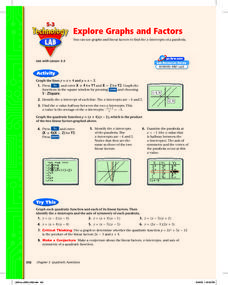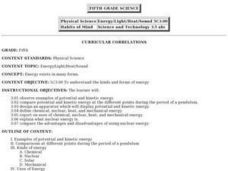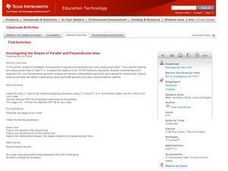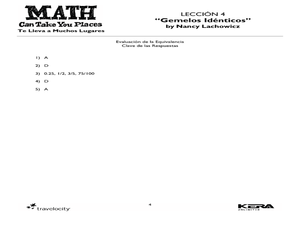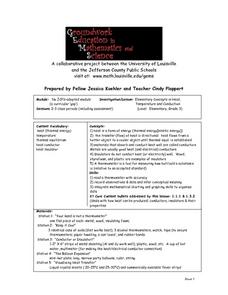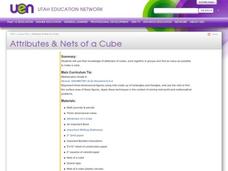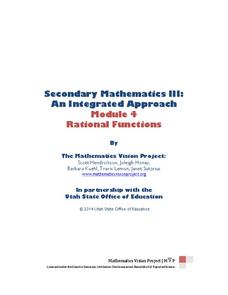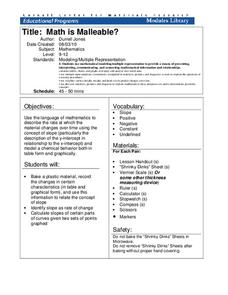Curated OER
Math Lesson: What Do You Want to Know? - Country Statistics
Students are able to identify the characteristics of a variety of graphs (i.e. bar graph, line graph, pie graph, scatter plot, population pyramids, etc.) They recognize how the type of data to be presented plays a role in choosing the...
Curated OER
Explore Graphs and Factors
Pupils graph the factors of a quadratic as linear equations and graph the parabolic equation in factored form. Also, they investigate the relationship between the x-intercepts of the lines and the zeros of the parabola.
Curated OER
Is the Hudson River Too Salty to Drink?
Students explore reasons for varied salinity in bodies of water. In this geographical inquiry lesson, students use a variety of visual and written information including maps, data tables, and graphs, to form a hypothesis as to why the...
Curated OER
Energy, Light, Heat, and Sound
Fifth graders investigate various forms of energy. They compare potential and kinetic energy at different points during the period of a pendulum, design an apparatus that displays potential and kinetic energy, and analyze the advantages...
Curated OER
Falling Into Geometry Through Paper Art
Students explore geometric shapes. In this kindergarten geometry lesson, students create a fall quilt consisting of three different paper geometric quilt squares that when assembled form a scarecrow, a pumpkin, and a crow.
Curated OER
Investigating the Slopes of Parallel and Perpendicular Lines
High schoolers investigate parallel and perpendicular lines. They use Cabri Jr. to construct and explore the relationships between the slopes of parallel and perpendicular lines. The drawing and measurement tools available with Cabri Jr....
Curated OER
Identical Twins
Sixth graders work with equivalent fractions, decimals, and percents. In this equivalency lesson, 6th graders participate in a number of activities aimed at increasing their understanding of equivalent expressions. They form a human...
Curated OER
Leaping!
Students properly leap and measure their distance. For this leaping lesson, students practice leaping for accuracy and proper form. Students estimate their leaps and measure with rulers. Students determine distance covered by the entire...
Curated OER
Elementary Concepts in Heat
Third graders read a thermometer with accuracy, record observations and data, and infer conceptual meaning. They integrate mathematical charting and graphing skills to organize their data. They explore what happens when they touch or use...
Curated OER
Attributes & Nets of a Cube
Third graders engage in a lesson that focuses on the attributes and forming of a cube. They construct a cube using different combinations while comparing a square with only two-dimensions. Students fold paper while following the...
Curated OER
Landforms
Learners study how landforms affect all aspects of a community. Students work in groups to identify landforms from other works of art. In cooperative groups Learners select a work of art depicting a particular land form and create a poem.
Curated OER
Favorite Foods
Students draw a picture. In this favorite foods lesson, students list the foods they like to eat and form each like into a complete sentence. Students cut the word in the sentences apart and then arrange them in the correct order with a...
Curated OER
The Sun-Earth Connection
Third graders research about the location of different planets from the sun. For this earth science lesson, 3rd graders discuss the weather in their place and identify common weather terminologies. They explain how tornadoes form and...
Curated OER
Positive and Negative Angles and Arcs
To better understand that the intersection point of two lines lies inside a circle, learners use their keen measurement skills. They discuss arcs, rays, tangent lines, and reflex angles. Then, they put their skills to work as they...
Curated OER
Does the Area of the Quadrilateral Change?
Students study area and quadrilaterals. In this multiplication and area lesson, students use Polystrip models to change rectangles to form different parallelograms. Students find the area of the models use a Geometer Sketchpad to find...
Curated OER
Heart Smart in a Heart Beat
As an introductory activity, young statisticians measure their heart rate at rest and after exercise and compute the mean and median, and create a box & whisker plot. This is followed by watching a video (that no longer seems to...
Curated OER
Problem Solving Techniques
Learners develop a pattern for problem solving. They gain confidence in their ability to solve problems and are introduced to mathematics help online.
Curated OER
Community Wellness Fair
Twelfth graders list ideas to create a wellness fair. They form student committees to organize times for each class to participate in the fair. Students assist in setting up the fair by putting up tables for the exhibitors, preparing...
Alabama Learning Exchange
Mix it Up! Exploring the Commutative and Associative Properties of Addition
Examine commutative and associative properties with your class. They'll explore the relationships between addition and subtraction and investigate patterns as they solve addition problems. Links to an assessment and a table game are...
Inside Mathematics
Quadratic (2009)
Functions require an input in order to get an output, which explains why the answer always has at least two parts. After only three multi-part questions, the teacher can analyze pupils' strengths and weaknesses when it comes to quadratic...
Mathematics Vision Project
Geometric Figures
Logical thinking is at the forefront of this jam-packed lesson, with young mathematicians not only investigating geometric concepts but also how they "know what they know". Through each activity and worksheet, learners wrestle with...
Mathematics Vision Project
Module 4: Rational Functions
Time to study the most sensible function — rational functions! The seven-lesson unit develops the concept of a rational function through a connection to rational numbers and fractions. Scholars graph functions, solve equations, and...
Cornell University
Math Is Malleable?
Learn about polymers while playing with shrinky dinks. Young scholars create a shrinky dink design, bake it, and then record the area, volume, and thickness over time. They model the data using a graph and highlight the key features of...
Teach Engineering
Energy Systems
Is electricity created in the outlet? Using posters of several energy systems, collaborative groups identify and describe the parts of their systems. The groups also look at the environmental impacts of the systems and present their...



